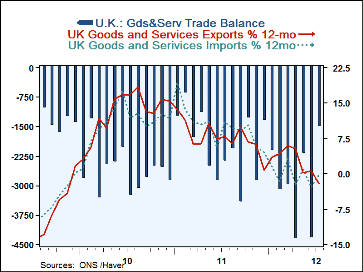 Global| Sep 11 2012
Global| Sep 11 2012UK Balance Shrinks as Trade Flows Slow
Summary
The UK trade balance improved moving to a smaller deficit position in July as exports rebounded strongly from a very weak June, gaining back what they had lost. But imports fell, building on losses over the last four months. Year- [...]
 The UK trade balance improved moving to a smaller deficit position in July as exports rebounded strongly from a very weak June, gaining back what they had lost. But imports fell, building on losses over the last four months.
The UK trade balance improved moving to a smaller deficit position in July as exports rebounded strongly from a very weak June, gaining back what they had lost. But imports fell, building on losses over the last four months.
Year-over-year trends show that exports are now losing momentum faster than imports. Imports appear to have stabilized to some extent on their yr/yr comparison.
Exports were helped in June by a surge of petroleum exports to Europe. The deficit in goods trade with the European Union (about 49% of British exports) narrowed to 4.27 billion pounds in July from 4.99 billion pounds in June. The trade gap with non-EU nations also fell to 2.88 billion pounds from 5.08 billion pounds, as exports to those countries rose to a record. However, sterling has begun to strengthen and that casts a shadow over the ability of UK exports to maintain this momentum.
UK economic data have been mercurial recently with some housing data showing price increases and the recent MFG and services PMI surveys showing a move higher. But the BOE still seems very worried about the economy. Money supply continues to contract.
The trade figures show a withering export trend and steady weakens in imports. The ongoing import weakness is a signal for poor domestic demand prospects.
Robert Brusca
AuthorMore in Author Profile »Robert A. Brusca is Chief Economist of Fact and Opinion Economics, a consulting firm he founded in Manhattan. He has been an economist on Wall Street for over 25 years. He has visited central banking and large institutional clients in over 30 countries in his career as an economist. Mr. Brusca was a Divisional Research Chief at the Federal Reserve Bank of NY (Chief of the International Financial markets Division), a Fed Watcher at Irving Trust and Chief Economist at Nikko Securities International. He is widely quoted and appears in various media. Mr. Brusca holds an MA and Ph.D. in economics from Michigan State University and a BA in Economics from the University of Michigan. His research pursues his strong interests in non aligned policy economics as well as international economics. FAO Economics’ research targets investors to assist them in making better investment decisions in stocks, bonds and in a variety of international assets. The company does not manage money and has no conflicts in giving economic advice.
More Economy in Brief
 Global| Feb 05 2026
Global| Feb 05 2026Charts of the Week: Balanced Policy, Resilient Data and AI Narratives
by:Andrew Cates






